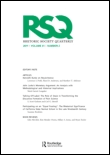
Rhetoric Society Quarterly
Scope & Guideline
Advancing Discourse in Communication and Linguistics.
Introduction
Aims and Scopes
- Interdisciplinary Rhetorical Analysis:
The journal emphasizes an interdisciplinary approach, integrating perspectives from fields such as communication studies, political science, cultural studies, and environmental studies, allowing for a rich analysis of rhetoric in different societal contexts. - Focus on Social Justice and Activism:
Many papers address themes of social justice, activism, and marginalized voices, reflecting the journal's commitment to exploring rhetoric as a tool for advocacy and resistance. - Investigation of New Media and Technology:
With the rise of digital communication, the journal has increasingly published work analyzing the rhetoric of new media, including social media, algorithms, and digital platforms, revealing how these technologies shape public discourse. - Historical and Cultural Rhetorics:
The journal maintains a strong interest in historical and cultural rhetoric, exploring how past rhetorical practices inform contemporary issues and how cultural narratives are constructed and contested. - Rhetoric of Science and Health:
There is a consistent focus on the rhetoric surrounding science, health, and technology, particularly in relation to contemporary issues such as public health crises, environmental challenges, and technological advancements.
Trending and Emerging
- Neurorhetoric and Cognitive Approaches:
Emerging themes in neurorhetoric and cognitive studies reflect a growing interest in the intersection of rhetoric with neuroscience, emphasizing how cognitive processes influence rhetorical practices and understanding. - Rhetoric of Crisis and Catastrophe:
With the recent global challenges like the COVID-19 pandemic, there is an increasing focus on rhetoric as it relates to crisis communication, public health narratives, and the societal implications of disasters. - Environmental Rhetorics and Climate Justice:
A notable trend is the rising emphasis on environmental rhetoric, addressing issues of climate change, ecological justice, and the rhetorical strategies employed in environmental activism. - Digital and Algorithmic Rhetorics:
The study of rhetoric within digital spaces, particularly concerning algorithms, social media dynamics, and online discourse, has gained momentum, reflecting the significance of technology in shaping contemporary rhetoric. - Intersectionality and Identity Politics:
The journal increasingly engages with themes of intersectionality, exploring how race, gender, sexuality, and other identity markers inform rhetorical practices and public discourse, indicating a commitment to inclusive scholarship.
Declining or Waning
- Traditional Rhetorical Theory:
There seems to be a gradual decline in publications strictly focused on classical rhetorical theory, as the journal shifts towards more contemporary applications and interdisciplinary connections. - Rhetorical Formalism:
Papers that heavily emphasize formalist approaches to rhetoric, such as strict genre analysis or structuralist critiques, have become less frequent, indicating a move towards more fluid and context-driven analyses. - Conventional Public Speaking Rhetorics:
The journal has seen a decrease in articles dedicated to the analysis of traditional public speaking and oratory, possibly reflecting a broader cultural shift towards digital and mediated forms of communication. - Focus on Canonical Texts:
There is a noticeable reduction in the examination of canonical texts in rhetoric, suggesting a pivot towards more diverse and contemporary sources that reflect current societal issues.
Similar Journals

JOURNAL OF COMMUNICATION
Exploring New Frontiers in Linguistic Research.Welcome to the JOURNAL OF COMMUNICATION, a premier academic publication in the fields of Communication and Linguistics, published by Oxford University Press Inc. Since its inception in 1951, this journal has been dedicated to fostering scholarly dialogue and advancing research in the dynamic landscape of communication studies. With an impressive impact factor and Q1 ranking in both Communication and Linguistics categories for 2023, it stands among the most influential journals, ranking 6th out of 1088 in Language and Linguistics and 10th out of 511 in Communication, reflecting its esteemed position in the academic community. The journal aims to publish innovative and rigorous research that explores the multifaceted dimensions of communication, making it an essential resource for researchers, professionals, and students alike. Although it is not an open-access journal, readers can access the valuable insights and groundbreaking studies contained within its pages at Journals Dept, 2001 Evans Rd, Cary, NC, 27513, United States, ensuring that crucial findings and theoretical advancements remain within reach of those passionate about the field.
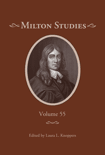
Milton Studies
Illuminating Milton: Insights into Literary ImpactMilton Studies is a prestigious journal dedicated to the rich and ongoing analysis of John Milton's work and its profound impact on literary theory and critique. Published by Penn State University Press, this journal holds a significant status within the realm of literature, evidenced by its Q2 categorization in the 2023 rankings and its strong Scopus rank of #288 out of 1106, indicating a notable presence in the field. Operating its convergence years from 2002 to 2009 and continuing from 2011 to 2024, Milton Studies provides a platform for scholarly engagement, fostering critical discourse that deepens understanding of Milton's contributions to literature and cultural studies. Though it follows a traditional publication model, it remains committed to accessibility and relevance, making it a vital resource for researchers, educators, and students alike who are passionate about exploring the complexities of literary heritage and theory.

Imago-Revista de Emblematica y Cultura Visual
Exploring the Depths of Visual CultureImago-Revista de Emblematica y Cultura Visual, published by Publicaciones Univ Valencia, serves as a vital platform for scholarship in the multidisciplinary fields of Visual Arts, Communication, and Linguistics. This Spanish journal has been recognized for its contributions to academic discourse, showcasing works that delve into the complexities of visual culture, emblems, and their interpretations within contemporary society. With an impressive ranking in Scopus, placing it in the Q2 category for Visual Arts and Performing Arts, and Q3 for Linguistics and Language in 2023, it stands out among its peers as a reputable source for researchers and scholars. Although it operates under a non-open access model, its content remains instrumental in advancing the understanding of visual narratives and their cultural implications. Located in Valencia, Spain, Imago not only reflects the academic rigor of its contributors but also fosters collaboration and exchange of ideas, making it an essential resource for professionals, students, and academics alike.

International Journal of Communication
Empowering voices through open access scholarship.International Journal of Communication, published by USC Annenberg Press, is a premier open access journal dedicated to advancing the field of communication studies. Since its inception in 2007, the journal has provided a vital platform for researchers, professionals, and students to engage with cutting-edge research, theoretical frameworks, and empirical studies. With an impressive Q1 quartile ranking in Communication for 2023 and a notable Scopus rank of 156 out of 511 in the Social Sciences Communication category, the journal consistently contributes to high-quality scholarly discourse. It covers a wide array of topics, making it a crucial resource for those looking to stay informed about the latest developments in communication research. The journal's commitment to open access enhances its reach and impact, fostering a global community of academics and practitioners dedicated to exploring the complexities of communication in contemporary society. This makes the International Journal of Communication an essential read for anyone interested in understanding the dynamics of communication today.

Talia Dixit-Revista Interdisciplinar de Retorica e Historiografia
Unveiling New Perspectives in Arts and Humanities ResearchTalia Dixit-Revista Interdisciplinar de Retorica e Historiografia, published by UNIV EXTREMADURA, SERVICIO PUBLICACIONES, stands as a prominent open-access journal in the diverse fields of Arts and Humanities, particularly focusing on Rhetoric and Historiography. With its ISSN 1886-9440 and a commitment to disseminating knowledge since 2006, this journal provides a platform for scholars to explore innovative interdisciplinary approaches within its scope. Located in Spain, Talia Dixit has garnered respect within academic circles, achieving a Q2 ranking in Literature and Literary Theory and Classics, as well as Q3 rankings in History, Linguistics, and Arts and Humanities (miscellaneous) as of 2023. Additionally, the journal's metrics indicate its relevance and appeal, reflected in its Scopus rankings across various categories. Researchers, professionals, and students alike will find Talia Dixit to be an essential resource for groundbreaking research and rich, diverse discussions that bridge the gap between historical contexts and rhetorical analysis.
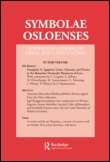
Symbolae Osloenses
Connecting Scholars Through Timeless InsightsSymbolae Osloenses, published by TAYLOR & FRANCIS LTD, is a distinguished journal in the field of Classics, with a rich history dating back to its inception in 1922. This UK-based journal has continuously contributed to the scholarly discourse surrounding ancient cultures, languages, and literature, making it a crucial resource for researchers, educators, and students alike. Though it operates under a subscription model, its impact on the academic community is underscored by its recent inclusion in the 2023 Scopus rankings, where it holds a respectable position in the 65th percentile among its peers. With decades of published research spanning from 1924 to 2023, Symbolae Osloenses remains committed to fostering robust academic dialogue and advancing knowledge in the Classics, catering to a diverse readership seeking to explore the nuances of classical studies.

Argumentation et Analyse du Discours
Connecting Theory and Practice in Discourse Analysis.Argumentation et Analyse du Discours is a leading open-access journal dedicated to the exploration of discourse analysis and the intricate dynamics of argumentation within the French language context. Published by the TEL AVIV UNIVERSITY, FACULTY OF HUMANITIES, FRENCH DEPARTMENT ADARR RESEARCH GROUP, this journal serves as a vital resource for scholars and practitioners interested in the theoretical and practical dimensions of argumentation. Since its inception in 2008, the journal has committed to offering innovative research articles that illuminate the interplay between language, culture, and ideology. Researchers and students alike will find invaluable insights within its pages, as it fosters interdisciplinary dialogue and promotes rigorous analysis in the evolving field of discourse studies. With its accessible format and engagement with contemporary issues, Argumentation et Analyse du Discours is essential for anyone seeking to deepen their understanding of communication in a rapidly changing world.

Journal of Early Modern Christianity
Exploring the Nexus of Faith and HistoryJournal of Early Modern Christianity is a prominent academic journal that explores the intricate intersections of history and religious studies during the early modern period. Published by WALTER DE GRUYTER GMBH in Germany, this journal plays a pivotal role in disseminating high-quality research and fostering scholarly dialogue in these fields. With an ISSN of 2196-6648 and an E-ISSN of 2196-6656, it has rapidly gained recognition, currently positioned within the Q4 category in both History and Religious Studies for 2023. Despite its relatively recent inception in 2014, the journal consistently seeks to elevate the academic discourse surrounding early modern Christianity, inviting contributions that offer fresh perspectives and rigorous analysis. While it does not operate under an open-access model, it remains committed to accessibility through institutional subscriptions. Researchers, professionals, and students dedicated to understanding the nuanced relationships between belief systems and historical contexts will find this journal to be an invaluable resource in their scholarly pursuits.
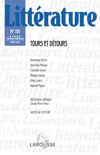
LITTERATURE
Fostering Innovative Perspectives in Literary Studies.LITTERATURE is a distinguished academic journal published by LAROUSSE, dedicated to the exploration and critical discourse of literary studies. Based in France, this journal, with ISSN 0047-4800 and E-ISSN 1958-5926, serves as a vital platform for scholars, students, and professionals interested in both contemporary and historical literary theory. Despite its current categorization in the Q4 quartile of literature and literary theory for 2023, LITTERATURE aspires to elevate discussions within the field, providing a peer-reviewed environment for innovative research and theoretical exploration. The journal covers an extensive range of topics, including literary criticism, narrative theory, and cultural studies, ensuring it remains relevant in an evolving academic landscape. With an unwavering commitment to fostering scholarly communication, LITTERATURE invites contributions that challenge conventional perspectives and push the boundaries of literary analysis, aiming to bridge the gap between academic scholarship and broader societal narratives.
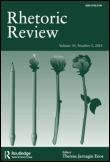
Rhetoric Review
Unveiling the Power of Rhetorical PracticesRhetoric Review, published by Routledge Journals, Taylor & Francis Ltd, serves as a vital platform for scholars in the fields of Rhetoric, Linguistics, and Literary Theory. Established in 1982, this esteemed journal presents a blend of theoretical frameworks and empirical studies that advance our understanding of rhetorical practices across diverse contexts. It holds a prestigious Q1 ranking in Literature and Literary Theory and a Q2 ranking in Linguistics and Language as of 2023, reflecting its influential role in shaping contemporary discourse in these disciplines. With an impressive Scopus rank of #85 out of 1106 in Literature and Literary Theory, Rhetoric Review is a go-to resource for researchers, professionals, and students aiming to explore the intricacies of language and communication. While the journal is not open access, it offers a comprehensive range of articles, reviews, and theoretical discussions that contribute significantly to both academic scholarship and practical applications in rhetoric. The journal’s commitment to publishing pioneering research ensures its relevance in an ever-evolving academic landscape.